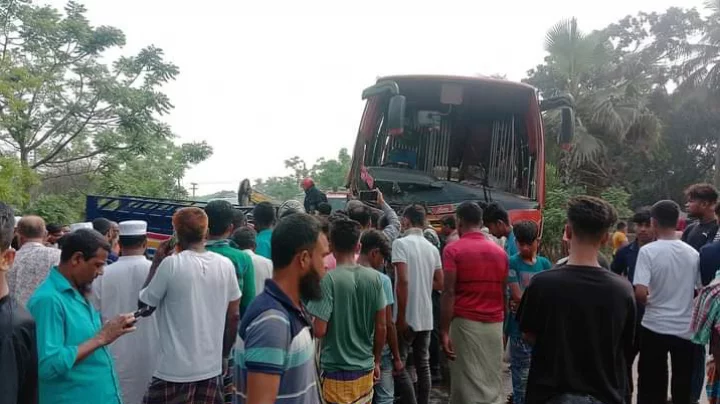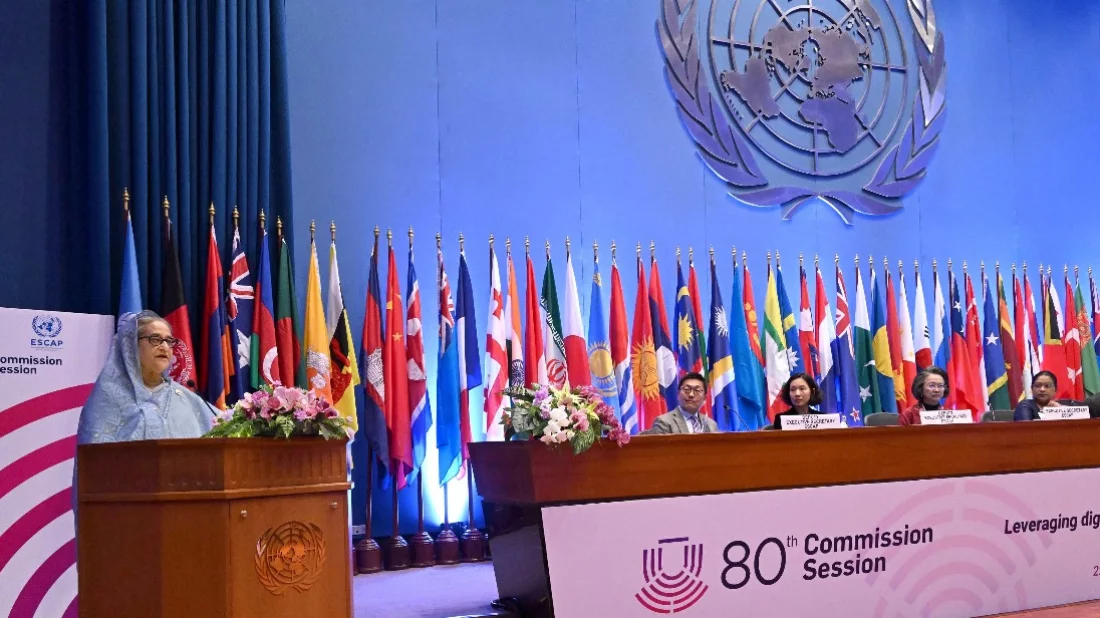EFD deployment began in August 2020 but rollout has been mysteriously slow

The installation of VAT machines has been mandatory for the last decade and a half, but not even 20,000 machines have been installed across Bangladesh, so far.
Experts say prioritizing the installation of electronic fiscal devices (EFDs) in all businesses – retail and wholesale – across Bangladesh could significantly boost the government's VAT collection efforts. Additionally, such a proactive approach could elevate the status of Abu Hena Md Rahmatul Muneem, chairman of the National Board of Revenue, to a prominent figure in the field.
There are complaints about VAT payments from customers not reaching the government treasury, attributed to a lack of EFDs at many businesses. Meanwhile, the National Board of Revenue (NBR) says although they are few in number, the installation of EFDs has yielded favourable outcomes in VAT collection.
Moinul Khan, a member of the NBR’s VAT Implementation and IT department, previously told this correspondent that the central tax administration was getting around Tk50,000 per month from each shop because of the device being used.
Before the introduction of EFDs, the monthly VAT collection from each shop had been Tk4,000-Tk5,000, he added.
The official said the NBR was planning to launch 60,000 more EFDs in the current financial year and another 300,000 in the next five.
Customers are required to pay VAT on all products and services in the country. However, a substantial portion of VAT revenue in the government exchequer originates from sectors including mobile phones, cigarettes, soft drinks and gas.
According to NBR data, the total VAT collection from various sectors in the country during the last fiscal year (2022-2023) amounted to Tk1,25,424 crore, achieving approximately 92% of the target. In the current fiscal year, during the initial nine months (July-March), VAT collection stood at Tk1,00,702 crore.
Economists and revenue officials feel there are opportunities to collect more VAT.
Annual transactions within the retail and wholesale sectors constitute approximately 13% of the gross domestic product (GDP), according to an NBR study. However, the reality is that nominal VAT is collected from retail and wholesale businesses – currently, Tk5,000 crore comes from the retail and wholesale sectors.
Revenue experts suggest that besides installing EFDs, there is the potential to increase annual VAT collection tenfold through proper enforcement. Emphasizing that the installation of EFDs is crucial for enhancing VAT collection, experts say the NBR should prioritize their immediate installation right now.
Shop owners also say that with the widespread installation of EFDs across all shops in the country, the government's VAT revenue could increase significantly.
Presently, VAT collection from retail businesses amounts to approximately Tk5,000 crore. However, according to the shop owners association, if authorities prioritize the installation of EFDs, it could potentially boost annual VAT revenue from this sector to Tk50,000 crore.
Meanwhile, stakeholders say aside from EFDs, if measures to curb VAT evasion are effectively implemented, the government has the potential to collect at least Tk1,75,000 crore annually from shops alone.
Tenfold increase
Bangladesh Shop Owners Association President Helal Uddin said the NBR was unable to provide the number of EFDs necessary, adding that the government would get at least 10 times more in revenue collection if it set up EFDs at all shops nationwide.
He highlighted that over the past five years, fewer than 20,000 machines had been installed at various business establishments, a stark contrast to the country's more than 6.5 million shops.
Despite the decision to introduce EFDs five years ago, their deployment remained less than 1% of shops, Helal added.
Helal further highlighted the disorganization within the current 1% deployment of EFDs, noting instances where some shops within the same market had the devices while others did not. He said customers tended to avoid shops with EFDs, underscoring the necessity for universal adoption across all shops.
Additionally, Helal mentioned the NBR's initial promise to provide EFDs to retail traders for free. “Later, the price of each EFD was fixed at Tk20,000. We decided to buy the machines at the request of the NBR. Presently, the cost of a machine ranges from Tk8,000 to Tk10,000. But unfortunately, the NBR has failed to supply the required number of devices.”
The association's leader emphasized that traders were eager to adopt EFDs. "Businessmen aspire to conduct their operations peacefully while adhering to government regulations. However, this objective is occasionally thwarted by the greed of certain individuals."
A major source of VAT – the main source of domestic revenue generation – is retail and wholesale trade. However, rampant VAT evasion plagues this sector, with its contribution limited to merely 3% of the total VAT collection.
Statistics reveal that a staggering 90% of VAT claimable in retail and wholesale businesses goes uncollected. Presently, the VAT rate for retail businesses stands at 5%. With over 7.5 million shop owners nationwide, including Dhaka, if each paid an average of Tk20,000 in VAT per month, the government could potentially amass Tk1,80,000 crore in revenue annually.
Very few shops have EFDs
In 2021, VAT detectives conducted a survey across eight markets in Dhaka, Narayanganj and Savar. Out of 1,024 shops surveyed, only 120 were registered for VAT. Even in major cities, numerous food, clothing and service establishments operate without VAT registration. This trend is particularly pronounced in areas outside Dhaka. However, VAT law dictates that businesses must obtain a VAT registration certificate if they meet the stipulated requirements.
Royal Village, a long-standing restaurant located in the Manik Nagar area of the capital, operates with an Electronic Fiscal Device (EFD) but fails to issue VAT invoices to consumers. If a consumer proactively requests an electronic cash register (ECR) receipt, the restaurant imposes an additional charge. Unfortunately, Royal Village is just one among the hundreds of restaurants in Dhaka engaging in VAT evasion.
The World Bank on April 2 said Bangladesh in the fiscal year 2018-2019 was deprived of about Tk2,00,000 crore in VAT, as the government was only able to collect Tk85,000 crore in VAT.
Unwillingness of officials
Dr Ahsan H Mansoor, executive director of Policy Research Institute, highlighted the effectiveness of EFDs in VAT collection, saying that widespread implementation of these devices could significantly enhance revenue collection.
He criticized the reluctance of the NBR's field-level officials to ensure the success of this initiative, before saying the NBR was not only lacking in manpower but also in its will to collect VAT.
The agency, comfortable in its current operating procedures, was unable to completely move out of the paper-based system, the expert added.
NBR officials were benefiting from its current set-up while the state was suffering, he noted.
Former NBR chairman Muhammad Abdul Mazid said many traders were reluctant to use EFDs, often shifting blame onto customers.
He pointed out that unethical traders continued to evade VAT even with EFDs in place.
Initiatives
Zahid Hossain, former chief economist at the World Bank's Dhaka office, highlighted that traders still perceived VAT as a burden, suggesting simplifying VAT collection processes and implementing an effective refund or credit system to alleviate trader concerns.
He said some traders benefitted from not using EFDs, and immoral officials also exploited this for personal gain.
The NBR has undertaken various initiatives, such as introducing lottery prizes for VAT payments made using EFDs, yet tangible outcomes remain elusive. Instead, there are reports of VAT payments circumventing EFDs, with many saying there is a lack of supervision and awareness.
In 2009, an initiative aimed at boosting VAT collection from retail and wholesale businesses through the introduction of electronic cash registers (ECRs) faced challenges and ultimately failed due to errors and irregularities. Subsequently, in 2018, authorities opted for EFDs, an improved version of ECRs. Initially, there was a plan to complete nationwide EFD installation within a year, but the results have been disappointing.
According to NBR officials, the installation of EFDs has not progressed much due to technical errors.
18,500 devices installed till December, more planned
NBR Chairman Abu Hena Md Rahmatul Muneem, on VAT Day on December 6 last year, said the agency would install 60,000 machines each year.
He believed that installing 300,000 EFDs could potentially yield an additional Tk20,000 in VAT collection, adding that around 18,500 devices had been installed till December.
The NBR introduced the Electronic Fiscal Device Management System (EFDMS) to bring transparency to VAT collection. After two years it gave Genex Infosys Limited the task of installing the devices as a subsidiary company to expedite the process.
After the inauguration of EFD deployment on August 25, 2020, NBR and Genex have installed devices at 18,505 institutions, comprising 18,005 EFDs and 500 sales data controllers (SDCs).
Meanwhile, the National Board of Revenue (NBR) aims to collect Tk1,70,000 crore in VAT in the next fiscal year to meet conditions set by the International Monetary Fund. To achieve this goal, this government agency is thinking of utilizing EFDs.
At a recent event, State Minister for Finance Waseqa Ayesha Khan emphasized the need for accelerated EFD installations, indicating her intention to recommend increased allocation in this sector.










